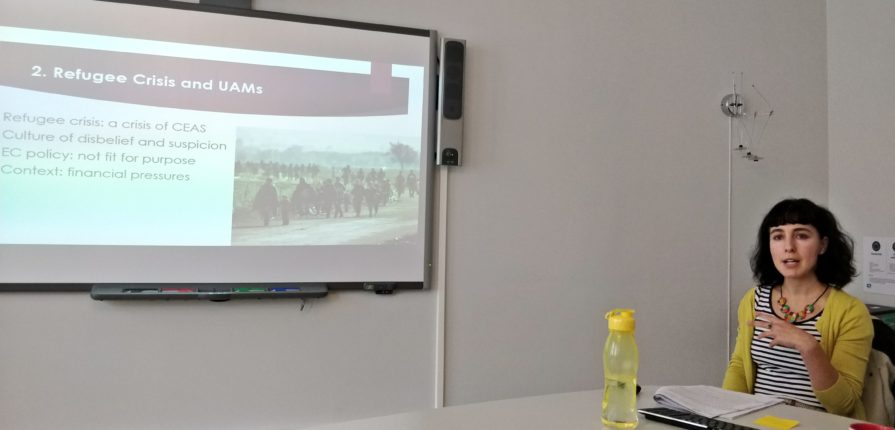INTERVIEW: Dr. Ingi Iusmen is researching the protection of unaccompanied migrant children, and visited the Centre as a guest researcher.
See the slides from the presentation “Protecting unaccompanied migrant children in Europe” at the bottom of the article.
What are you researching?
My current research focuses on the protection of child refugees, particularly unaccompanied migrant children, both in Europe and the US. More specifically, the main aim of my research is to unpack the main institutional, policy/legal and political factors that explain the violation of these children’s human rights. To this end, I hope that my research can provide useful empirical evidence and findings that could feed into policy recommendations (at national/international level) to improve the situation of these children in practice.
One of the main conundrums that I’m trying to explain is the huge gap between the policy provisions (which tend to be pro-children, hence positive) and the situation on the ground (how these children are treated in practice). To me, excellent research has to have societal implications: it needs to make a difference to the lives of the most disadvantaged groups in our society, like child refugees. And this is what I strive to achieve with my research.
What motivates you to do this research?
I’m originally from Romania, and although I spent most of my adult life in Western Europe (UK), the emotional images of children in Romanian orphanages after 1990 stuck with me, perhaps on a subconscious level. To this end, my research interests and the projects I worked on focused on vulnerable groups (e.g. Roma children, children in institutions, missing children, child refugees etc) driven by a two-fold motivation.
First, I wish to produce excellent scientific research that would be recognized and used by my peers and the broader scientific community. Second, by working closely with policy-makers and relevant child rights NGOs, I try to make sure that my research findings can have policy implications, by improving the plight of these vulnerable groups.
Is there a book or article within your field that you would recommend?
I would recommend the book of an inspiring author, and world-leading expert on human rights, child refugees and unaccompanied minors in particular: her name is Jacqueline Bhabha, and the book is titled “Child Migration and Human Rights in a Global Age” (2014).
What are your plans for future research?
Between 2019-2020 I will be Fulbright-Schuman scholar based at the FXB Centre for Health and Human Rights, at Harvard University ,where I will be working (under the supervision of Prof. Jacqueline Bhabha) on the protection of child refugees in the US. This will be an exciting opportunity for me to conduct such a timely and topical research investigation at one of the world’s top universities, and working with a team of top experts in human rights and health issues. I intend to publish a number of research papers, including a book, from this project’s findings.
What are your impressions after visiting the Centre and Bergen?
I’m so grateful to my friend Dr. Adriana Bunea (Dept of Comparative Politics, UiB) for putting me in touch with Prof Marit Skivenes: this was such a great opportunity, for me in particular, to find out about the Centre for Research on Discretion and Paternalism and Marit’s exciting projects on the protection of child rights in Europe. I really enjoyed my time at the Centre and found it very productive.
Everyone, from PhD students, post-docs to administrators as well as academic staff, were very friendly and made me feel very welcome from the outset. Prof.Skivenes, in particular, made sure that I met all the relevant colleagues at the University, and overall, she was a very hospitable and generous host, which made my visit such an enjoyable experience. The Centre is a vibrant and inclusive place, which makes it a perfect place to work in.
Ingi Iusmen’s profile at University of Southampton
See the presentation from Ingi Iusmen’s guest lecture:
Protecting unaccompanied migrant children in Europe 15.08.19

